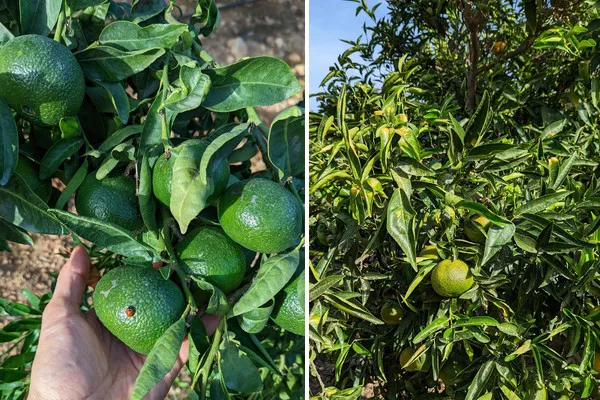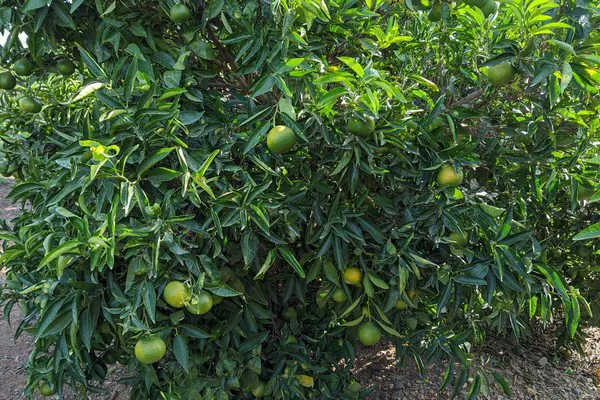The new clementine season has begun at Euro Gijbels. "We started with Orogros and are currently harvesting the last Oronules. We also have to start picking our main variety, Clemenules, now," begins John Gijbels from this Belgian company's farm in Spain.

Left, Leandri, right, Clemenules
John would have liked to wait a bit, but demand is forcing him to offer supply. "There's something unusual happening with the Clemenules. The relentless heat in Spain means the trees aren't stressed enough which the fruits need to change color. Big day/night temperature changes are the main cause of stress."
"That colors the Clemenules from bright green to a lovely orange. However, the days are still 25°C, and the nights hover around 17°C. That's not a big enough difference for coloring. The temperature should begin dropping this week, so ideally, we'd harvest in a fortnight. However, to keep delivering, we'll have to start cherry-picking them now," says John.

"I'd normally never begin picking fruit like this. Don't get me wrong; they taste great. The lack of stress only affects the peel, and that makes them less popular. We won't sell them at standard prices, which will cost us money. Nevertheless, I have to harvest to prevent a shortage. There are random trees that got somewhat more wind and sun. We can, thus, try to meet all our delivery days."
John is cautiously optimistic about the rest of the season. "We have very nice Leandri fruit on the trees. We'll have to wait until January for this premium variety. These were truly top-notch last year and, so far, look the same. We'll generally have about 20% fewer Clemenules on the market than last year," he continues.
"That's because of the drought and many other factors. But the quality's good. Plus, there seem to be more larger sizes hanging on the trees than normal. We'll have to wait and see regarding market prices. Those will have to improve to cover all the increased costs."
Vegetables
Gijbels expects a tough Spanish vegetable season. "Many growers and customers are anxious. But, overall, there seem to be fewer vegetables planted, resulting in a fairly optimistic outlook. An oversupply would be genuinely problematic, but with less consumption and supply, I hope the market stays balanced. I think, in five weeks, there will already be less produce on the market, so, hopefully, we can keep getting good prices," he explains.
John Gijbels
"But that's sorely needed. Sweet potato prices, for instance, remain the same, but cultivation costs shot up by a few euros per box. And that's not the only increase. Say I were to get last season's prices for cauliflower, I'd need more money to cover my costs. Thus, margins are getting ever-tighter."
"It's in everyone's interest to be able to spread the costs throughout the chain. You can't simply pass all those on to consumers. I hope everyone's willing to help each other get through these difficult times, and above all, that the market ultimately understands the situation," John concludes.
For more information:
John Gijbels![]() Euro Gijbels
Euro Gijbels
21 Acacia Street
2440, Geel, Belgium
Cami de les Arenes s/n
43300 Mont-roig del Camp
Tarragona, Spain
Email: [email protected]
Website: www.eurogijbels.be
